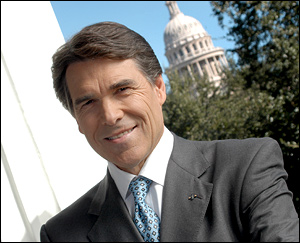The latest Republican presidential debate was held last night in Las Vegas and, at least among the candidates themselves, it appears that former Massachusetts Gov. Mitt Romney and Texas Gov. Rick Perry are still the top two contenders. They, with their podiums next to each other on center stage, dominated the evening’s responses and personal confrontations.
Even though retired businessman Herman Cain is surprisingly atop many current state polls, he appeared to retreat somewhat into the background of this forum as the candidates actively engaged each other more so than in previous debates. CNN host and debate moderator Anderson Cooper allowed the candidates more freedom in engaging their opponents and provided adequate time to answer the questions, leading to what became a lively evening.
Perry, coming into this debate with his back against the wall after performing poorly in two previous sessions, came on strong, particularly against Romney, over several issues. He was much more articulate and confrontational than in the past, and appeared to have a greater presence on stage. Whether this translates into positive momentum before the GOP primary voting public is yet to be determined.
Polls have already shown major ebbs and flows for Rep. Michelle Bachmann (R-MN-6), Perry, and Cain throughout the course of the fledging campaign. Bachmann won the Iowa Straw Poll in August and then immediately began tumbling downward, landing solidly in the single-digit second tier.
Cain has experienced the opposite course. Largely due to his debate performances, he has gained considerable strength and risen to the top echelon. How long he will stay there is anyone’s guess.
Gov. Perry had a meteoric rise as soon as he entered the race, but fell quickly back after two sub-standard debate performances and a lack of taking any overt action to reverse his slide.
Therefore, the statistical data as reflected in state and national political polls, makes It apparent that the eight debates, only one of which appeared on a broadcast network, are nonetheless having a clear effect upon the early stages of this race.
So far, there is only one candidate who has appeared to rebound after falling into oblivion. And, it is only through his superior debate performances to which his rise can be traced, since the public forums are the semblance of his campaign. This man is former House Speaker Newt Gingrich.
Driven to the 3 percent range nationally after a disastrous start that saw most of his top campaign staff bolting to the Perry campaign, Gingrich is now coming back to the low double-digit mark — right around where he started. It is doubtful, however, he will ever leap back into serious contention because of a lack of a campaign organization and a fundraising machine that is badly in need of repair (Gingrich has only $353,000 cash on hand as of the latest Sept. 30, 2011 campaign financial disclosure report). In the latest Public Policy Polling national survey (Oct. 7-10) the former Speaker has climbed into third place, behind Cain and Romney, with a surprising 15 percent of the Republican primary vote.
Can Perry follow a similar course to that of Gingrich? He needs to, and his challenge last night was to launch himself on such a trajectory.
The polls have told us two things. First, Mr. Romney, despite always placing near the top in every survey, has a ceiling in the low 20s that he can’t seem to crash through. This makes him vulnerable to a candidate who can break out of the pack and contest him in a one-on-one battle. Of all the candidates, Perry is still the only one who has the financial resources to land in such a position, particularly if he successfully portrays himself as the conservative alternative to the more moderate Romney.
The second finding is that debate performances can tangibly send a candidate spiraling — either up or down, as Gingrich, Perry, and Cain have all proven. With the Iowa Caucuses now set for Jan. 3, 2012, and New Hampshire possibly moving to December, Phase I of the election cycle has officially drawn to a close. Now, they begin playing for keeps.

